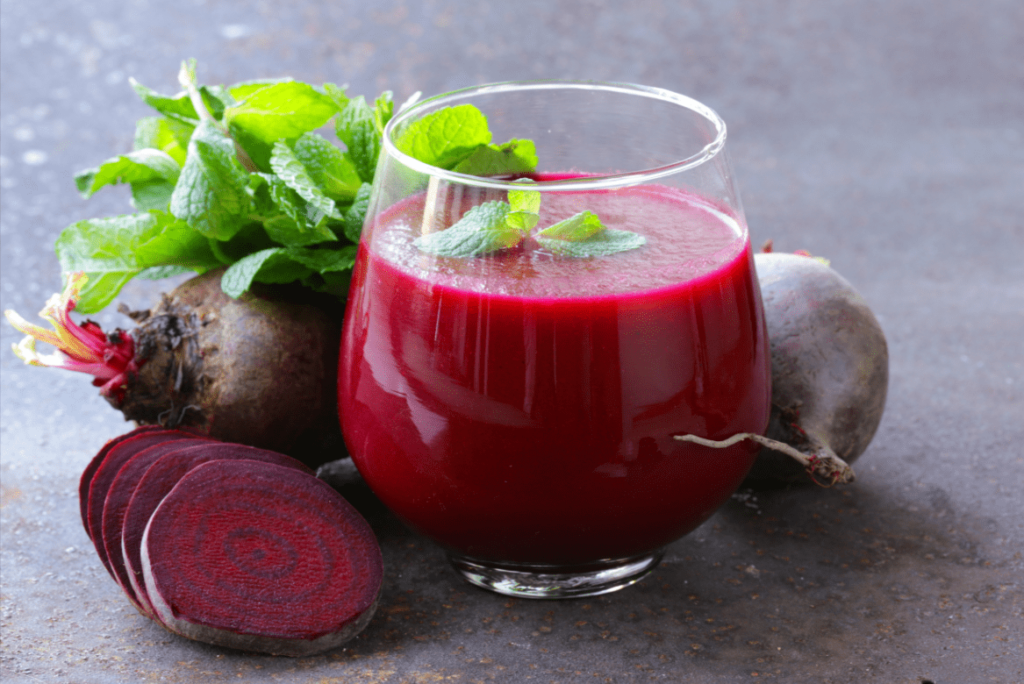Beet juice is derived from the beetroot plant (Beta vulgaris), a subject of extensive research for its health benefits. Packed with essential nutrients and polyphenols (distinct plant compounds), beetroot can aid in improving athletic performance, supporting liver function, and lowering blood pressure.
This article delves into the advantages of beet juice, its nutritional content, and key safety factors to consider.
What Is Beet Juice?
Beet juice is made by blending or pureeing beets and then straining the mixture to obtain a smooth liquid. To enhance taste and increase shelf life, water or citric acid may be added.
This juice is rich in vitamins, minerals, and bioactive substances like betanin, betaine, and nitrate. Dietary nitrates found in beet juice are converted into nitric oxide (NO) once inside the body. NO is a natural gas that helps widen blood vessels (vasodilation), which improves oxygen delivery throughout the body. This increased oxygen is crucial for energy production, whether for physical activity, overall health, or cognitive functions.
Betalains are the pigments responsible for the distinctive red and yellow hues of beets. These compounds also endow beets with antioxidant and anti-inflammatory qualities. There are two primary types of betalains: betacyanins, which are red-violet, and betaxanthins, which are yellow. Betanin is a major type of betacyanin found in beets.
Betaine, an amino acid that the body can produce on its own, is present in beets, though its concentration in beet juice can vary. Research into betaine highlights its potential antioxidant and anti-inflammatory benefits, as well as its role in supporting liver health.
Advantages of Consuming Beet Juice
Beet juice is known for its diverse health benefits thanks to its rich nutritional composition.
Nutritional Value of Beet Juice
An 8-ounce serving of beet juice typically provides:
- Calories: 62 kcal
- Protein: 2 grams
- Carbohydrates: 15 grams
- Fiber: 3 grams (11% of daily value, or DV)
- Magnesium: 35 milligrams (11% DV)
- Phosphorus: 35 milligrams (5% DV)
- Potassium: 315 milligrams (12% DV)
- Folate: 65 micrograms (16% DV)
Nutrient levels may differ based on the beet variety, processing methods, and any added water.
Magnesium is crucial for more than 300 bodily processes, including energy metabolism, muscle and nerve function, maintaining healthy blood pressure, and supporting bone health.
Phosphorus is important for bone and dental health, maintaining cell membrane integrity, and producing energy.
Potassium is necessary for cellular functions, while folate is essential for the synthesis of DNA and metabolism of proteins.
It’s important to note that whole, raw beets generally contain more concentrated nutrients like potassium and folate compared to beet juice. Additionally, beet powder has a distinct nutritional profile compared to beet juice.
Supports Blood Pressure Management
Beet juice can be beneficial for controlling blood pressure due to its high nitrate and nutrient content.
The nitrates in beet juice are converted into nitrous oxide in the bloodstream. This compound helps relax and dilate blood vessels, which can lead to a reduction in blood pressure.
The impact of beet juice on blood pressure can be significant. An increase of just 2 mm Hg in systolic blood pressure (the top number) can elevate the risk of heart attack by 7% and stroke by 10%.
Research has shown that beet juice supplementation can lower systolic blood pressure by an average of 3.55 mm Hg and diastolic blood pressure by 1.32 mm Hg in individuals with hypertension.
A meta-analysis found that beet juice supplementation led to an average reduction of 3.55 mm Hg in systolic blood pressure and 1.32 mm Hg in diastolic blood pressure among individuals with hypertension.
Beet juice typically starts to influence blood pressure within 30 minutes to three hours after consumption. However, its effects are relatively short-term, with some studies indicating that they may fade within 10 hours.
It’s important to note that the effectiveness of beet juice for managing blood pressure is not universally agreed upon. Several variables can also influence blood pressure, including:
- Age
- Initial blood pressure levels
- Body composition
- Amount of beet juice consumed
- Frequency of consumption
Nitrates are not the sole compounds in beet juice that affect blood pressure. The antioxidants present in beet juice also play a significant role in enhancing its ability to manage blood pressure.
To fully benefit from beet juice, it should be consumed daily. Research indicates that extended use, particularly for more than 14 days, tends to produce more pronounced results.
Bioactive Components in Beet Juice
Beet juice contains bioactive compounds known as betalains, with concentrations ranging from approximately 0.8 to 1.3 grams per liter (g/L).
Betanins, a subgroup of betalains, have been studied for their potential health benefits, but their low bioavailability—how effectively a nutrient is absorbed by the body—raises questions about their actual impact. Some studies have not detected betanin in participants’ blood plasma after consuming beet juice, suggesting it may be lost or broken down during digestion. However, other research on betanin levels in urine indicates that bioavailability might vary between individuals.
Overall, further research is needed to better understand the health benefits of betanin in humans.
It Enhances Physical Performance
Beet juice can enhance athletic performance by reducing fatigue. During physical activity, muscles require substantial oxygen to produce energy. Beet juice’s impact on nitric oxide and oxygen delivery helps to lessen fatigue that results from exercise.
Studies indicate that beet juice may lower the rate at which the body uses oxygen during exercise (VO2). High VO2 levels can make exercise strenuous and difficult to maintain over time. By reducing VO2, beet juice can improve endurance and overall exercise performance.
The exact mechanism by which beet juice influences VO2 remains unclear, though it may be connected to enhanced mitochondrial efficiency or function. Mitochondria, the energy-producing organelles in cells, play a crucial role in this process.
Key components of beet juice contribute to athletic performance. Nitrates in the juice boost energy production and help reduce fatigue during exercise, leading to longer and more efficient workouts. Additionally, betalains help minimize muscle damage caused by exercise, aiding in recovery.
However, while beet juice shows promise for improving athletic performance, its benefits may be more relevant to healthy individuals or recreational athletes rather than elite or highly trained athletes.
It Supports Cognitive Function and Brain Health
Beet juice positively impacts cognitive abilities, particularly those involving the prefrontal cortex. This brain region handles functions such as speech, memory, and executive functions, which include higher-level mental processes that govern other cognitive skills and behaviors.
A study that administered 450 milliliters (15 ounces, or almost 2 cups) of beet juice with 5.5 millimoles of nitrates showed enhanced cerebral blood flow, which was linked to improved cognitive performance. Nitric oxide produced from the nitrates in beet juice helps boost blood flow to the brain, promotes vasodilation, and enhances neuronal activity.
It Offers Anti-inflammatory and Antioxidant Advantages
Studies indicate that beet juice provides protection against cellular damage due to its anti-inflammatory and antioxidant effects. Research highlights that beet juice possesses unique chemical properties that may make it a more potent antioxidant compared to other beet products. Observations from cell-based studies suggest that the antioxidant activity of beet juice is enhanced after digestion.
Further preliminary research indicates that compounds like betaine and betanin in beet juice help neutralize harmful free radicals, which are linked to inflammation and chronic diseases. Additionally, betanin has been shown to inhibit inflammatory processes directly, with some in vitro studies suggesting it may be as effective as certain common anti-inflammatory drugs.
However, further research is necessary to fully understand the impact of beet juice on inflammation and oxidative stress in human subjects.
It Promotes Liver Health
Beet juice contributes to liver health in several ways. The antioxidants present in beet juice help protect the liver from damage, while betaine plays a role in safeguarding cells and decreasing fat accumulation in the liver.
In one study, participants with metabolic dysfunction-associated steatotic liver disease (MASLD) who consumed 250 mL (5 ounces) of beet juice daily for 12 weeks showed improvements in their lipid profiles. They experienced reductions in triglycerides and low-density lipoprotein (LDL) cholesterol, commonly known as “bad cholesterol,” and increases in high-density lipoprotein (HDL) cholesterol, or “good cholesterol.” Additionally, beet juice was found to reduce the accumulation of fat in the liver among these individuals.
Research indicates that substances in beet juice can bind to bile acids, which inhibits their reabsorption into the bloodstream. Instead of being reabsorbed, these bile acids are expelled from the body. To compensate for the loss, the liver draws cholesterol from the blood to produce more bile, thereby lowering LDL cholesterol levels in circulation.
However, there is limited evidence on whether beet juice is as effective as whole beets in this bile acid binding process.
How to Use Beet Juice
Research on beet juice varies widely in terms of dosage, making it challenging to establish a standard amount for health benefits. The Dietary Guidelines for Americans generally advise limiting juice intake to no more than 8 ounces per day.5
For those looking to enhance athletic performance, studies suggest different approaches for chronic and acute supplementation. Chronic use typically involves consuming 70 mL of beet juice twice daily for three to six days prior to an event. Acute use, on the other hand, involves drinking 70 mL of beet juice two to three hours before exercise.
There are numerous ways to integrate beet products into your diet for added health benefits. You can enhance your meals by adding beets to various dishes for extra sweetness, vibrant color, and a nutritional boost. Beet juice can be blended into smoothies or used as a base for soups, sauces, or oatmeal.
Beets are available for purchase either raw, with just the beetroot, or with both the beetroot and stems. When storing raw beets, keep the skin intact and place them in a dry, cool location.
Before eating raw beets, they should be washed and peeled. While raw beets are edible, they may have a more bitter taste compared to cooked ones.
For convenience, you might opt for pre-cooked or pickled beets. These can be easily sliced and added to salads, grain bowls, soups, and pasta, or enjoyed on their own.
Be aware that preparing and cooking beets can be quite messy. Betalains, the pigments in beets, can stain your hands, clothing, and any surfaces they come into contact with, leaving red, violet, or yellow marks.
Potential Effects and Misconceptions
Drinking beet juice can sometimes cause a change in urine color, turning it pink. This occurs due to betanin compounds that are not fully metabolized and are expelled from the body. This condition, known as beeturia, is harmless and not associated with any health problems.
Historically, there was concern that high nitrate consumption could lead to the formation of cancer-causing substances. However, current research has not found any evidence linking beet juice with the production of carcinogens.
In fact, some studies suggest that dietary nitrates may be associated with a lower cancer risk. This is possibly because nitrates are commonly found in vegetables, which are a key part of a healthy diet.
Takeaway
Beet juice is a nutrient-rich drink that can enhance any diet. Packed with essential vitamins, minerals, nitrates, and bioactive compounds such as betalain and betanin, it offers a range of health benefits. Regular consumption of beet juice can improve overall health by reducing blood pressure and enhancing athletic performance.

